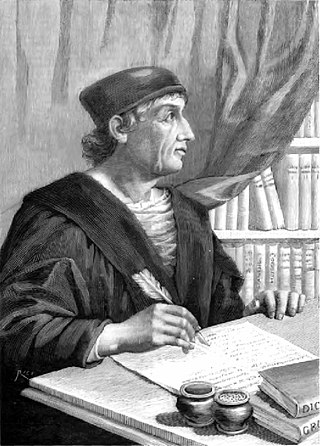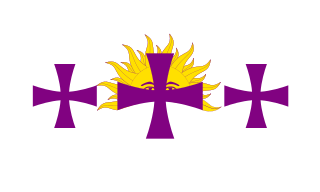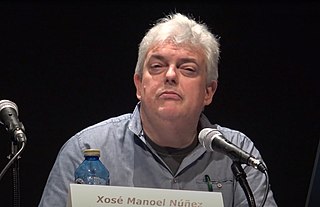Related Research Articles

Augusto Barcia y Trelles was a Spanish politician, several times member of the Congress of Deputies, who served as acting Prime Minister of Spain from 10 May 1936 to 13 May 1936 due to former PM Manuel Azaña being elected as President of the Republic. He was also a lawyer and a Freemason.

Antonio de Nebrija was the most influential Spanish humanist of his era. He wrote poetry, commented on literary works, and encouraged the study of classical languages and literature, but his most important contributions were in the fields of grammar and lexicography. Nebrija was the author of the Spanish Grammar and the first dictionary of the Spanish language (1495). His grammar is the first published grammar study of any modern European language. His chief works were published and republished many times during and after his life and his scholarship had a great influence for more than a century, both in Spain and in the expanding Spanish Empire.

Hispanidad is a Spanish term describing a shared cultural, linguistic, or political identity among speakers of the Spanish language or members of the Hispanic diaspora. The term can have various, different implications and meanings depending on the regional, socio-political, or cultural context in which it is used.
Amok is a 1944 Mexican romantic drama film directed by Antonio Momplet and starring María Félix and Julián Soler. The film is based on the Stefan Zweig novel Der Amokläufer.
Ángel Martínez Casado and died in Virgen del Camino, León Province, Spain, 03/04/2024) was a Dominican friar and PhD in History and Theology. He received humanistic and religious education at La Virgen del Camino College, from where he entered the novitiate in the Dominican Order in October 1965, in Palencia. He began his religious studies in Las Caldas de Besaya (Santander) and Salamanca, where he made solemn religious profession in 1973.
Federico Martínez Roda is a professor of history at the Valencia Catholic University.

Enrique García Hernán is a Spanish historian of the culture of early modern Europe. His research examines the interaction of religious sentiment, political thought and international relations in the sixteenth, seventeenth and eighteenth centuries. It attempts to bridge the gap between the study of forms of cultural and intellectual expression and the realities of political, diplomatic and military organization. He is a Corresponding Fellow of the Royal Academy of History, member of the Board of Directors (Vocal) of the Spanish Commission for Military History, and Fellow (Académico) of the Ambrosiana Academy of Milan. His current academic affiliation is as a research professor in the Institute of History, within the Center for Humanities and Social Sciences at the Spanish National Research Council. The Spanish National Research Council is the largest public institution dedicated to research in Spain and the third largest in Europe.
Miguel del Rey is a Spanish author of military history. He was the editor of Ristre magazine in its second stage. He has published many books and articles.
Le nouveau socialiste was a weekly newspaper in Spanish and French published from Toulouse, France from 1972 to 1976. It was an organ of the Spanish Socialist Workers' Party (historic).
Per Catalunya! was a monthly publication issued from Havana, Cuba from 1942 to 1953. It was an organ of the Unified Socialist Party of Catalonia (PSUC), published in Catalan language. The majority of Catalan refugees in Cuba were members of the party. The first issue was published on May 10, 1942.

Ernestina de Champourcín Morán de Loredo was a Spanish poet. She is most associated with the Generation of '27.
The so-called Geneva Manifesto is a term referring to the declarations made by Infante Juan, Count of Barcelona in the Swiss newspaper Journal de Genève published on 11 November 1942, in which he called for the formal restoration of the Spanish monarchy with him as King, as he was Alfonso XIII's legitimate heir. King Alfonso died a year earlier.

Gustavo Morales y Delgado is a Spanish journalist, periodist and former politician. He is the former deputy director of the newspaper El Rotativo and former editor of the newspaper Ya. He has collaborated as a military analyst with BBC and Russia Today. He won the Carlos V Award for Journalism, two orders of Merit and Palma de Plata.

The Sindicato Español Universitario was a corporatist students' union in Spain, created in the 1930s during the Second Spanish Republic, by the Falange Española under the leadership of José Antonio Primo de Rivera. The SEU was inspired by students' unions linked to contemporary fascist parties of Italy and Romania.
The Eastern Army, also translated as the Army of the East, was a unit of the Spanish Republican Army that operated in the eastern part of Spain during the Spanish Civil War. Republican forces deployed on the Aragon front of the war initially came under the command structure of the unit. Later in the Civil War, the unit operated in Catalonia, defending the Republican defensive line along the Segre river.

The Niños de Rusia were the 2,895 children evacuated to the Soviet Union by the authorities of the Second Spanish Republic during the Spanish Civil War. During 1937 and 1938, the children were sent from the Republican zone to the Soviet Union to avoid the rigours of war. Spanish children were sent to several other countries as well as Russia during this period and they are more widely referred to as Niños de la Guerra.

Xosé Manoel Núñez Seixas is a Spanish historian who specializes in nationalism studies, the cultural history of war and violence, and migration studies.
Adela Galiana y Albaladejo, also known as Adela Galiana de Osterman was a Spanish writer, playwright, poet and columnist.
Juan Simeón Vidarte Franco-Romero was a Spanish lawyer and socialist politician. He was deputy secretary general of the Spanish Socialist Workers' Party between 1932 and 1939, and secretary of the Congress of Deputies during the first legislature of the Second Spanish Republic (1931–1933). After the Spanish Civil War, he went into exile in Mexico.
Marcelino Domingo Sanjuán was a Spanish teacher, journalist, and politician who served as a minister several times during the government of the Second Spanish Republic.
References
- ↑ Enciclopedia general ilustrada del país vasco. Auñamendi. 1974. p. 151. ISBN 978-84-7025-147-4.
- ↑ Rosa Soler i Mòdena; Eulàlia Miret i Raspall (1 January 1995). Inventari de l'arxiu Lluís Nicolau d'Olwer. Institut d'Estudis Catalans. p. 112. ISBN 978-84-7283-296-1.
- ↑ Jorge de Hoyos Puente (8 August 2012). La utopía del regreso. Proyectos de Estado y sueños de nación en el exilio republicano en México. El Colegio de Mexico AC. p. 316. ISBN 978-607-462-519-6.
- ↑ Joan Estruch Tobella (1 January 1982). El PCE en la clandestinidad (1939-1956). Siglo XXI de España Editores. p. 44. ISBN 978-84-323-0447-7.
- ↑ The Ukrainian Quarterly. Ukrainian Congress Committee of America. 1959. p. 71.
- 1 2 New York Public Library (1944). Bulletin. p. 128.
- 1 2 Fernando Piedrafita Salgado; Fundación Universitaria Española (1 July 1996). Fondos hemerográficos del archivo del Gobierno de la II República Española en el exilio. Fundación Universitaria Española.
- 1 2 Estudios sobre el comunismo. 1958. p. 65.
- ↑ El movimiento guerrillero de los años 40. Fundación de Investigaciones Marxistas. 1 February 2003. p. 115. ISBN 978-84-87098-39-0.